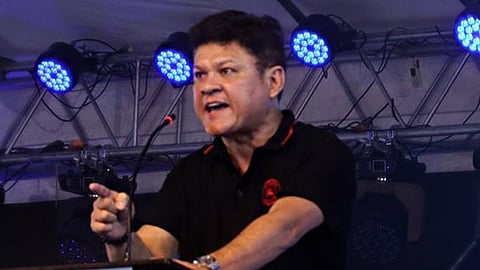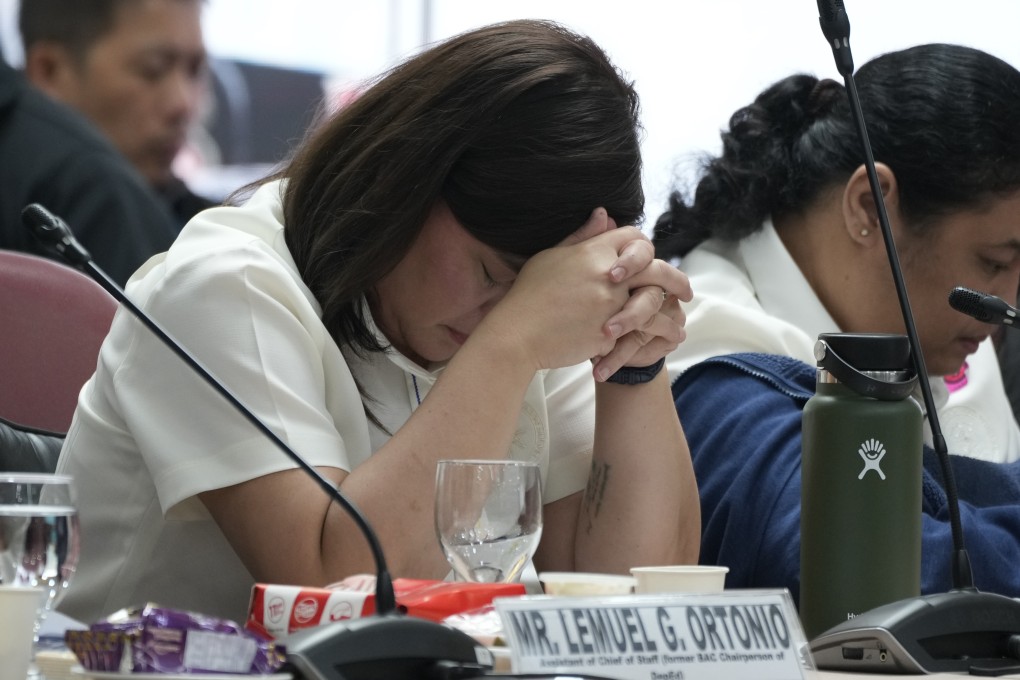In a stunning and deeply unsettling development that has sent shockwaves through Philippine politics, Vice President Sara Duterte has been suddenly left vulnerable, following the unexplained removal of her top security officer. Colonel Raymond Dante Lacheca, head of the Vice President’s Security and Protection Group (SPG), was relieved of his command without warning. The most chilling detail: the Office of the Vice President (OVP) received no explanation for the action, leaving many questioning the motives behind this abrupt decision.
Observers describe this “decapitation” of the Vice President’s security as far more than a routine personnel shuffle. It is being interpreted as a deliberate signal, a calculated message to demonstrate power and control over one of the country’s most prominent political figures. Analysts warn that this move leaves Sara Duterte “physically vulnerable,” exposing her to potential threats and amplifying the uncertainty surrounding her political position. Former spokesperson Trixie Cruz-Angeles described the act as a “soldier-heavy message” and a reminder that “they are watching, and they can move at any time.”

The OVP confirmed the removal in a terse statement: “The Office of the Vice President was informed of the relief of Colonel Raymond Dante Lacheca on October 6, 2025. No message or explanation was given to the OVP.” This lack of transparency has fueled a storm of speculation and concern, with supporters asking whether this is merely the opening move in a broader political scheme. Social media erupted with warnings and conjecture, with many suggesting that such an action could be a precursor to further attacks on the Vice President’s authority.
This shocking removal comes at a politically sensitive time. For the second consecutive year, the House of Representatives has moved to slash the OVP’s budget, a decision framed by critics as punitive. Opponents have sought to portray Duterte as “defiant” or unwilling to cooperate, labeling her a “bratinela” for not personally attending a recent plenary hearing. However, defenders point out that the Vice President was fulfilling her official duties on the ground in Bogo City, Davao Oriental, personally leading relief operations for victims of two massive earthquakes that struck the region, measuring 7.5 and 6.8 in magnitude. Many view the budget cut and the security shake-up as deliberate political maneuvers intended to humiliate the Vice President while drawing public attention away from pressing national issues.
As the nation grapples with the unfolding security crisis, another high-profile figure has entered the fray: Paolo “Pulong” Duterte, son of former President Rodrigo Duterte. In a fiery and uncompromising statement, Paolo condemned the International Criminal Court’s refusal to grant interim release for his ailing father, calling it a “gross and disgraceful miscarriage of justice.” He escalated the rhetoric by alleging that the CIA conspired in his father’s “kidnapping” and vowed direct retaliation against those responsible.
“To all kidnappers of my father,” Paolo Duterte declared, “I will make sure that you will pay for this crime that you have committed… You might just have helped him become a martyr.” His words, widely circulated on social media, have added another layer of intensity to the political landscape, suggesting that the Duterte family is prepared to confront those they perceive as threats directly.
The timing of these events has led many analysts to suspect that the apparent chaos may, in fact, be a carefully orchestrated diversion. While the public is focused on the Vice President’s budget issues, the dismantling of her security, and Paolo Duterte’s explosive statement, the real scandal—the one that could implicate some of the country’s highest-ranking officials—is being obscured. According to investigators and prominent vloggers, attention is being diverted from the massive flood control scandal, an issue involving potentially trillions of pesos in misappropriated public funds.
This scandal, quietly stalled in the Senate and buried in the House, allegedly involves “suitcases of money” and reaches into the highest echelons of government, with some reports implicating House Speaker Martin Romualdez. Observers argue that while the nation is captivated by the drama surrounding the Vice President, crucial investigations into systemic corruption are being delayed or deliberately blocked. Media coverage has also been criticized, with allegations that certain outlets are “bayaran” (paid) to shift the narrative toward sensationalist distractions rather than substantive reporting.

The implications of this diversion are significant. By focusing public attention on personal drama and high-profile statements, political actors may be seeking to protect those involved in the misappropriation of public funds. The strategy appears to exploit both media dynamics and public perception, channeling outrage toward visible, emotionally charged events while obscuring deeper, systemic issues that could trigger political accountability.
Public reaction has been swift and polarized. Supporters of the Vice President and her family view the security dismantling and Paolo Duterte’s statement as proof of a coordinated political attack, while critics argue that the drama is a calculated effort to manipulate public perception. The result is a highly charged environment where speculation, rumor, and outrage dominate discourse, while the essential questions of governance, transparency, and accountability remain unresolved.
As this unfolding political drama continues, several critical questions remain: Who is truly orchestrating the diversion, and for whose benefit? When will investigators fully expose the flood control scandal, and who is ultimately responsible? How will the public reconcile the visible theatrics with the larger, hidden crises that threaten institutional integrity? The answers remain unclear, but the stakes are enormous.
In the midst of this chaos, one fact is undeniable: Philippine politics has entered a perilous phase, where personal vendettas, public outrage, and hidden agendas intersect with the nation’s urgent need for transparency and accountability. As Vice President Sara Duterte navigates the sudden vulnerability created by the removal of her security, and as Paolo Duterte issues his warnings of retaliation, citizens are left to watch, analyze, and question what is really happening behind the scenes.
The grand diversion may be working, but the consequences of ignoring systemic corruption and political manipulation are far-reaching. The unfolding story of the Vice President’s exposed security and Paolo Duterte’s explosive rhetoric serves as a stark reminder that in Philippine politics, appearances are often deceiving, and what captivates public attention may be carefully curated to hide the truth.
As the drama plays out, the key question remains: Who truly benefits from this distraction, and what are they concealing while the nation watches the spectacle? The answers may determine not only the course of the current administration but also the future of governance and public trust in the Philippines.